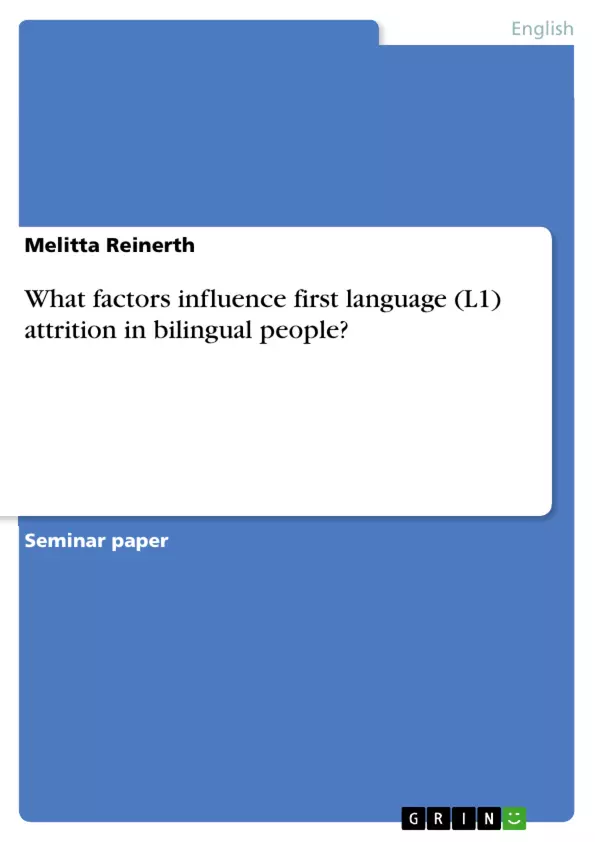Every child will acquire at least one language. A lot of people learn more languages during their lifetime e.g. during emigration in a country with another language. During situations like these the first language (from now on referred to as L1) might get lost while the second language (from now on referred to as L2) establish as the new dominant language. But not every emigrant discovers language attrition. The different factors of language attrition in bilingual people will be presented in this term paper.
Table of Contents
- 1. Introduction
- 2. What is language attrition?
- 3. Sociolinguistic factors in L1 attrition
- 3.1 Sociolinguistic factors in adults
- 3.2 Sociolinguistic factors in children
- 4. Psycholinguistic factors in L1 attrition
- 5. A case study in L1 attrition
Objectives and Key Themes
This term paper aims to investigate the factors influencing first language (L1) attrition in bilingual individuals. It explores the reasons why some bilingual speakers experience a decline in their L1 proficiency while others maintain fluency, even after extended periods of reduced L1 use.
- Definition and types of language attrition
- Sociolinguistic factors contributing to L1 attrition (e.g., attitude, time, code-switching)
- Psycholinguistic factors influencing L1 attrition (e.g., language plasticity)
- Case studies illustrating L1 attrition in different contexts
- Impact of L1 attrition on various aspects of language, including pragmatics
Chapter Summaries
1. Introduction: This introductory chapter sets the stage for the term paper by defining the phenomenon of L1 attrition in bilingual speakers. It establishes the context by highlighting the common scenario of L1 loss among emigrants and briefly introduces the sociolinguistic and psycholinguistic factors that will be examined in detail throughout the paper. The chapter lays out the structure of the paper and introduces the concept of the research that will be discussed in the following chapters.
2. What is language attrition?: This chapter provides a formal definition of language attrition, drawing on the work of Chin and Wigglesworth (2007) and Schmid (2009). It distinguishes between language attrition and language shift, clarifying that the focus of the paper is on individual-level attrition rather than community-level language change. Different types of language attrition are also identified, highlighting that the primary focus is on attrition caused by reduced exposure to the L1 following emigration.
3. Sociolinguistic factors in L1 attrition: This chapter delves into the sociolinguistic factors that contribute to L1 attrition, separating the discussion into adult and child speakers. The role of attitudes and motivation in language use is explored, referencing studies on the impact of social pressures and community integration. The influence of time since emigration on L1 competence and the impact of code-switching on L1 maintenance are also analyzed. The chapter uses specific examples of how immigrants might incorporate words from their new language into their L1 vocabulary and how pragmatic aspects of language use (such as responding to compliments) can be impacted. It also highlights the potentially more dramatic effects of L1 attrition observed in children.
Keywords
Language attrition, bilingualism, L1 attrition, sociolinguistic factors, psycholinguistic factors, code-switching, language attitudes, motivation, time, emigration, case study, pragmatics, language maintenance, language shift.
Frequently Asked Questions: Language Attrition Term Paper
What is the overall topic of this term paper?
This term paper investigates the factors influencing first language (L1) attrition in bilingual individuals. It explores why some bilingual speakers experience a decline in their L1 proficiency while others maintain fluency, even after reduced L1 use.
What are the key themes explored in the paper?
The paper examines the definition and types of language attrition, sociolinguistic factors (attitudes, time, code-switching), psycholinguistic factors (language plasticity), case studies illustrating L1 attrition, and the impact of L1 attrition on various aspects of language, including pragmatics.
What is the structure of the term paper?
The paper is structured into five chapters: an introduction defining L1 attrition; a chapter formally defining language attrition and differentiating it from language shift; a chapter exploring sociolinguistic factors in L1 attrition, separated into adult and child speakers; a chapter on psycholinguistic factors; and a case study chapter illustrating L1 attrition.
What sociolinguistic factors are discussed in relation to L1 attrition?
The paper discusses the roles of attitudes and motivation in language use, the impact of social pressures and community integration, the influence of time since emigration, and the impact of code-switching on L1 maintenance. Specific examples of vocabulary incorporation and pragmatic impacts are also provided.
What psycholinguistic factors are considered?
While the provided text doesn't detail specific psycholinguistic factors beyond mentioning "language plasticity," it suggests that this aspect will be covered in a dedicated chapter.
What is the difference between language attrition and language shift?
The paper clarifies that language attrition focuses on individual-level decline in L1 proficiency, while language shift refers to community-level language change.
What types of language attrition are discussed?
The paper identifies different types of language attrition, focusing primarily on attrition caused by reduced exposure to the L1 following emigration.
What kind of case study is included?
The paper includes a case study (detailed in a separate chapter) illustrating L1 attrition in a specific context, though the specifics of the case study aren't provided in the preview.
What are the key words associated with this term paper?
Key words include: Language attrition, bilingualism, L1 attrition, sociolinguistic factors, psycholinguistic factors, code-switching, language attitudes, motivation, time, emigration, case study, pragmatics, language maintenance, and language shift.
- Quote paper
- Melitta Reinerth (Author), 2014, What factors influence first language (L1) attrition in bilingual people?, Munich, GRIN Verlag, https://www.grin.com/document/1009916



